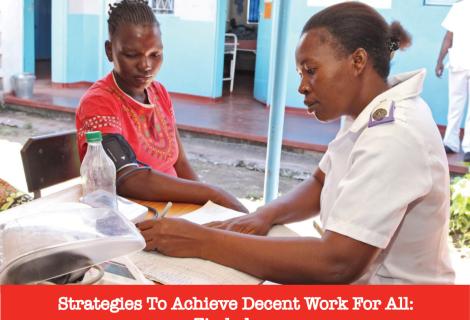
SAGE Research Report. Strategies To Achieve Decent Work For All: Zimbabwe
Social Protection For Formal And Informal Economy Workers In Zimbabwe
Social protection a term that incorporates social assistance, social insurance social safety nets, livelihood programmes, labour market interventions and social care programmes. Social protection is key aspect of decent work and has been defined in different ways by various international organisations. According to the International Labour Organisation (ILO), social protection refers to the provision of benefits to households through public or collective arrangements to protect against low or declining living standards. The United Nations Development Programme (UNDP) (2016) defined social protection as a set of nationally owned policies and instruments that provide income support and facilitate access to goods and services by all households and individuals at least minimally accepted levels, to protect them from deprivation and social exclusion, particularly during periods of insufficient income, incapacity or inability to work.
Decent work sums up the aspirations of people in their working lives. It involves opportunities for work that is productive and delivers a fair income, security in the workplace and social protection for families, better prospects for personal development and social integration, freedom for people to express their concerns, organise and participate in the decisions that affect their lives and equality of opportunity and treatment for all women and men.
It is now widely acknowledged that decent work is important as it provides an important link between economic growth and poverty reduction, and thus, sustainable and humane development. There has been an increased urgency among international policy makers, particularly in the wake of the global financial and economic crisis of 2008 and the global COVID-19 pandemic, to deliver quality jobs along with social protection for workers and the citizens; and respect for rights at work to achieve sustainable, inclusive economic growth, and eliminate poverty.
Furthermore, given the rise in gender inequalities amplified by COVID-19 pandemic makes it more imperative for governments to develop social protection responses sensitive women-related challenges both at workplaces and household level. Women workers face inequalities and discrimination in the workplace based on maternity and family responsibilities; glaring gender-pay differentials; gender stereotyping; difficulties in balancing work and family life; occupational segregation; and, are overrepresented in the informal economy, thus making decent work deficits a gendered issue.
To complement social protection measures, an adequate living wage and the upholding of workers’ rights is imperative for the attainment of decent work. In Zimbabwe wages and incomes inequalities and workers’ rights violations have grown tremendously over the years. Social dialogue, key to development of responsive social protection measures at workplace and national level has been undermined by various political and economic forces. This has seen the trade unions and CSOs embarking on various strategies to bring back the issue of decent work as a national priority for the achievement of sustainable and humane development.
In addition, the volatile macroeconomic environment has also challenged social protection measures rendering most of them meaningless. High rise in poverty level and informalisation of the economy puts further strain on the existing social protection measures, thus creating massive decent work deficits for workers both in the formal and informal economy.
It is in the light of the above challenges that this paper explores the state of decent work deficits, with particular reference to social protection, the role that macroeconomic and legislative frameworks have played in shaping the existing context of social protection in Zimbabwe for workers in the formal and informal economy. The paper will also analyse the various initiatives including campaigns on decent work for the formal and informal economy, best practices and recommendations centered on policy advocacy areas post COVID-19.